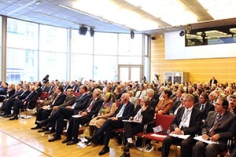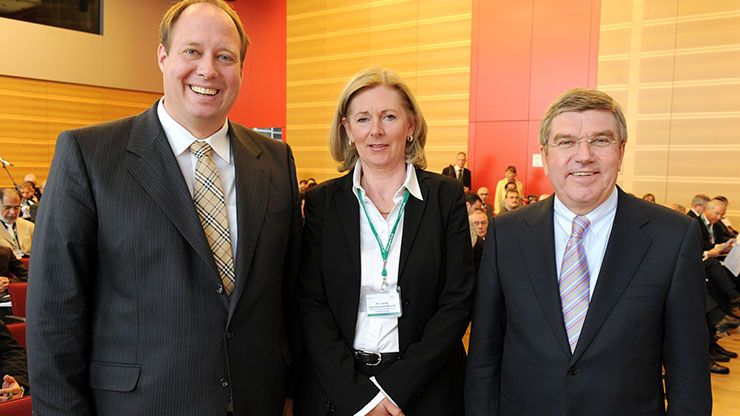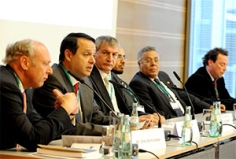The 2nd German-Arab Education and Vocational Training Forum, which took place in Berlin on October 12th and 13th, provided renewed opportunities for German and Arab training providers, companies and professionals from public and private education and vocational training sectors to discuss the potential for cooperation directly with one another. Educational experts from Arab countries and Germany reported on new projects and trends.
The fact that the number of attendees increased from 250 to 280 when compared with last year is a clear indication of the reputation "Training – Made in Germany" enjoys in the Arab world.
By means of this forum, iMOVE and Ghorfa are continuing their strategic partnership in education and vocational training. The forum was once again under the auspices of Annette Schavan, the Federal Minister of Education and Research of the Federal Republic of Germany.
The main topics of the 2nd German-Arab Education and Vocational Training Forum
In her welcome address, Sabine Gummersbach-Majoroh, Director of iMOVE, introduced the main topics of the event. These included education and vocational training initiatives in the Arab world, the costs and benefits of vocational education for industry, the education of Arab women and, the cooperation of universities and higher educational institutions.
Dr. Thomas Bach, President of Ghorfa, advocated for a unified strategy in the development and expansion of vocational training and educational systems in the Arab States. At the same time, he declared understanding and the development of trust to be fundamental in effectively meeting challenges and overcoming obstacles in vocational training and educational cooperation.
The Saudi-Arabian Ambassador, Prof. Dr. Ossama Abdulmajed Ali Shobokshi, emphasised the efforts of his government in education and vocational training. However, he lamented the small number of Saudi-Arabian students currently studying at German universities and called for improved entry conditions for those students wanting to study abroad.
Dr. Helge Braun, Parliamentary State Secretary, Federal Ministry of Education and Research of the Federal Republic of Germany, conveyed greetings from the Minister, who sponsored the event. He emphasised that in its last report on vocational education and training, the OECD, the Organisation for Economic Cooperation and Development, praised Germany‘s dual education system. Braun also lauded the involvement of many Arab States in vocational training and education sector as exemplary.
Education Initiatives in the Arab World
During the first panel session on vocational training and educational initiatives in the Arab world, the Deputy Minister for Educational Affairs from Saudi-Arabia, Dr. Mohammed Abdulaziz Al-Ohali, spoke about university education in his country. He emphasised government support to further foster educational reform as a long-term project for the good of the nation and for the sake of international competition.
Professor Dr. Ashraf Mansour from German University Cairo (GUC) introduced his educational institution, which primarily follows practice-oriented teaching. In order to prepare for working life, several production facilities were set-up in an industrial park at the university in cooperation with German industrial companies.
Dirk Demtroeder from IPIC-Ferrostaal reported on a company initiative to improve vocational training and educational cooperation between the United Arab Emirates and Germany. Companies are actively pursuing an exchange with German partner companies to set-up scholarships, practicums and German language courses.
Mohamed Ahmed Helal from the Technical and Vocational Training TVET-Reform Project, explained the efforts on the part of the Egyptian government to reform their vocational training and education system. The objective is primarily stronger integration of all interest groups involved, a combination of technical training and higher education, as well as sustainable financial solutions.
Dr. Stefan Weber, Director of the Museum for Islamic Art in Berlin, then revealed the museum plans for a modular system of educational programs.
Costs and benefits of vocational education and training for industry
The second panel session illustrated the costs and benefits of vocational training and education for industry.
Saeb Nahas, President of Nahas Enterprises from Syria, spoke of education as a special responsibility and as a beneficial long-term investment of companies in view of the extremely young population in the Arab States.
Dr. Hussein Omran from the Syrian-German Business Council called for education to be even more finely-tuned in order to shape and form personal talents and abilities of the trainees and to cultivate these specifically for the advancement of society.
Dr. Günter Walden, from the Federal Institute for Vocational Education andTraining (BIBB) presented the latest research with respect to the cost and benefits of education and vocational training in Germany. In accordance with this research, the benefits for the company outweigh the training costs.
Dr. Nader Imani from Festo Didactic introduced the seminars the company is offering on process optimisation and problem-solving techniques. He also reported on partnerships between Festo and local educational institutions in Syria, Lebanon and Oman.
Martin Stöckmann presented Siemens AG as one of the largest training providers in Germany. Stöckmann emphasised that companies which provide training also benefit because employees and co-workers strongly identify with company goals and, as a result, employee effort and commitment increases.
Successful German-Arab Partnerships in Vocational Training
Successful German-Arab partnerships in vocational training was the topic of the third panel session.
Christian Staab-Schmidt from Lucas-Nülle introduced the global training provider and manufacturer of teaching materials; their biggest market is the Near East.
In his presentation, Dr. Klaus Bader-Labarre of the German non-profit-organisation InWEnt, focused on E-learning as a key technology for change and innovation due to dramatic user increase in recent years in the Arab world.
Tina Völker from Renac outlined the qualification requirements in the field of solar energy. The company‘s education offerings include vocational training courses, specialisations in higher education, individual training worldwide and other services such as consulting and international PR.
Dr. Frank Renken from Deutsche Gesellschaft für Technische Zusammenarbeit (GTZ) presented Arabterm.org., a technical universal dictionary used to translate technical instruction manuals and to support local initiatives in standardising technical Arabic.
Imane Shoukry from the Egyptian HEDO Academy for Human Treasure Development spoke about the process of turning her organisation into a private welding company. Based on a collaboration with the German Welding Institute, HEDO would like to assist the Egyptian branch in becoming even more successful and to create an Egyptian Welding Association.
Women and Education in Oman
The moderator, Dr. Gabi Kratochwil, introduced the fourth panel session with a quote from Queen Rania of Jordan: "The education of a girl is likely the greatest possible return on investment".
In her keynote address, Dr. Zainab bint Ali bin Said Al Qasmiah, Ambassador of Oman, addressed the topic of Women and Education, particularly in Oman. Facts and figures illustrated the enormous progress made in this area, as well as the positive cooperation with Germany. The rapid development of Oman under the governance of the current Sultan is evident in that, prior to 1970, no vocational education and training was provided for females and now, there are virtually as many female as male pupils and students.
Sonia Zoghlami from the German training provider gpdm confirmed that although an increasing number of women are being educated and undergoing training, too few are being actively employed. The human resources development company has developed a special qualifications program called "Fatima", which focuses specifically on women in the Arab world and adjusts its flexible modular system to the needs of women.
Tarek Abulzahab from German Education and Training GmbH reported on the set-up of a Training Institute for Women in Yemen. Its greatest success factor was taking into account the social aspects and real life circumstances of these women.
Cooperation in Higher Education in the Arab World
During the fifth panel session on cooperation in higher education, Professor Dr. Günter Meyer from the University of Mainz outlined German-Arab cooperation in the field of higher education based on German universities abroad and bilateral educational programs.
Professor Dr. Rolf Granow from the Technical University in Lübeck reported on the benefits of E-learning in the field of higher education: The program "Oncampus", of which Granow is Managing Director, opens up access to extra-occupational online-studies.
The goal of Professor Dr. Elias Jammal from the University of Heilbronn, is to increase employability of graduates in economics. To that end, two English-language courses of study were set up. A new Masters Program in Business Economics was developed in conjunction with the University in Cairo.
Klaus Stark from the German Academic Exchange Program (DAAD), presented the Master’s Program "Integrated Water Resources Management". This will be the fourth time it is carried out in cooperation with a German and an Arab university. The objective is to have graduates from diverse backgrounds work on a solution to the water crisis in the Arab region.
Perspectives of German-Arab Cooperation in Vocational Education and Training
The closing plenary session focused on the perspectives of German-Arab cooperation in vocational education and training.
To begin with, Professor Dr. Salah M. Aliwi Al-abbadi, Cultural Consultant, Embassy of Iraq in Germany, called for qualification possibilities for Iraqi citizens in Germany, in light of the beleaguered educational system in his country.
Professor Dr. Ashraf Monsour from German University Cairo suggested founding an association of German universities and made the case for enabling more students to spend time abroad.
Dr. Claus W. Biermann from Philips advocated for the development of medical simulation centres in the Near East, in order to improve medical training for doctors.
Saeb Nahas from Nahas Enterprises in Syria pointed out that qualified vocational training and education in one’s own country not only defuses social problems, but also reduces the influx of illegal immigrants to Europe.
In her closing remarks, Sabine Gummersbach-Majoroh, Director of iMOVE, emphasised the significance of vocational education and training for all industrial branches and called for even closer cooperation between training providers and industry.




